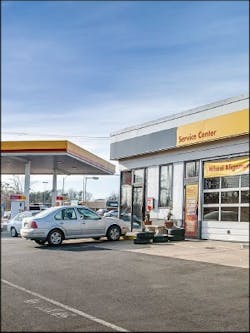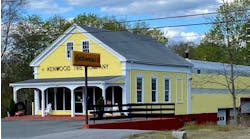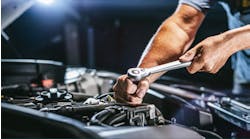It’s easy to dismiss something so small, something so seemingly unimportant and trivial, Scott Brown says. After all, it’s just a set of keys—well, two sets of keys to be exact.
Preparing to return a repaired vehicle to a customer, one of Brown’s apprentice technicians quickly snagged the keys from the hook. But, then, the technician paused. Brown watched him stand there for another moment, scanning the updated list of finished jobs. The technician then grabbed a second set of keys and made his way to the door.
“I asked him, ‘Wait, what are you doing with those other keys?’” Brown remembers.
The technician, Brown says, looked at him and, holding up the second set of keys, simply said, “I’ll have to deliver this one next. If I bring them with now, I won’t have to come back in and waste the time looking it up again.”
Brown smiled, nodded, and sent the technician on his way.
“Again, something so simple, right?” he says, still proud of the moment more than a year later. “But that just shows the mindset everyone has here.”
It’s that mindset (and a whole lot of operational processes and systems that helped develop it) that keeps Brown’s 44-year-old Springfield, Va., shop, Cardinal Plaza Shell, humming at its $4 million-a-year pace.
And his team pulls it off out of less than 2,000 square feet of shop space.
No, that revenue number doesn’t include his business’s gasoline segment, or its retail or tire sales. It’s strictly parts and labor, Brown says.
The stark contrast between the shop’s physical size (it has only four full-service bays) and its sales makes Brown’s operation a model example of doing more with less—a small, proud, family-owned business that demonstrates that scale doesn’t come from the amount of cement poured into the ground.
It comes from efficiency, Brown says, and the development of a shop culture that always puts the needs of the customer first.
A 44-Year Connection
While his shop does its share of marketing, Brown credits the majority of his steady stream of customers to the shop’s reputation built over decades of quality, efficient service.
“Everything we do builds that reputation,” he says. “That’s why each detail matters so much.
Extenuating Circumstances
Springfield is a true bedroom community. Located about 15 miles outside of Washington, D.C., Brown’s market is filled with commuters.
And it always has been. Since the day his father opened the gas station/service center in 1969, Cardinal Plaza Shell has been a fixture in the same location on Old Keane Mill Road.
“We have a unique set of circumstances we have to work in, as every shop does,” says Brown, who has run the shop since he graduated college in 1986. “That’s the thing: We have to find what works for us in our shop.
“You talk to another shop doing something really great and effective, you can’t just plug it in. You have to figure out how to apply it to the way you do things and the market you’re looking at. I think we’ve gotten the hang of that.”
For Cardinal Plaza, that’s meant embracing its market type and using its gasoline segment as a key differentiator for the business.
As a designated Shell service station—one of very few remaining in his region—Brown says the gasoline segment is required to operate 24/7, 365 days each year. Brown carries that concept of availability to customers to his service segment.
The shop is open seven days each week, from 6 a.m. until 9 p.m.
“We’re a bedroom community; our customers aren’t around here during the day,” he says. “We’re open at the times that are convenient for them to come in. It’s as simple as that.”
Build Your Own Staff
For nearly every employee at Cardinal Plaza Shell, Brown says this was their first job in the industry—and some have made it their only job. Brown has three technicians that just celebrated their 25th anniversaries with the company in 2013.
Chris Chagnon begin working for Brown as a 16-year-old pumping gas. Fifteen years later, Chagnon is a service advisor, and has never worked anywhere else.
“You could tell a similar story for everyone here,” Chagnon says, noting that all three advisors have never worked in a shop other than Cardinal Plaza Shell. “I think the difference is that [Brown] likes taking people on like that, and we try to help people grow in their roles and in their careers. Everyone’s a part of that. We have this feeling that we’re all in this thing together, and we all benefit when we’re doing well.”
That concept is apparent in the apprentice program, which Brown says the shop has done since he can remember. Through longtime relationships with the directors of his area’s three high school vocational programs, Brown is able to mine a steady crop of potential employees.
“For whatever reason, we’ve had better luck with people out of high school rather than the local colleges,” he says. “We look for personality fit, people that are hard-working, willing to learn and understand the importance of what we do for customers.”
And then Brown works them hard. They spend four days per week on the maintenance shift, and then a fifth day shadowing a master tech—six hours spent learning and the final three spent cleaning the shop.
“That [shadow day] is all about education and training,” Brown says. “It’s how they develop their skills and get that experience we want them to have before they get into the bays later on. It’s absolutely become crucial to everything we’ve done here.”
Set Up for Efficiency
To allow his shop to do the numbers it does and be open the hours it is, Brown has had to focus on every minute detail of his facility’s setup.
“Everything is about having each bay, each lift be as efficient as possible,” he says.
As far as appearances go, the building is your typical Shell service station: gasoline, offices, restroom and retail in the front; service bays in the back; all surrounded by a sea of asphalt parking lot and canopied pump stations.
There are five garage doors. Technically, Brown has five bays; the fifth is permanently designated as a state vehicle inspection station. While it contributes greatly to car count (it’s a virtual carousel of rotating vehicles), inspections are a low-revenue segment and, much like his gasoline business, provide a marketing lift. And that particular bay is never used for anything else.
It’s the other four bays that greatly contribute to the shop’s bottom line. And Brown has meticulously organized everything. Each technician has his specific tools in his bay, and larger equipment is stored in a communal area toward the middle to allow easy access.
But here’s where Brown’s setup gets a little outside the box: His two outdoor lifts. Limited by his space, and not wanting to either overload his master technicians with minor oil changes and bulb replacements, Brown purchased two additional lifts that are for all quick work and are manned by his two apprentices.
“The shop floor’s small,” Brown says. “And we get so much work, I don’t want my techs bogged down by the little things, and we don’t want those small jobs to pile up. It increases efficiency significantly.”
Overall, the shop averages just a shade under 100 percent efficiency per lift and up to 140 percent per technician.
The key to the strong numbers, says service advisor Chris Chagnon, is the shop’s ability to clearly separate light and heavy mechanical work, allowing more experienced technicians to work on difficult jobs and the newer employees to learn from the smaller jobs.
“We get a lot of light service in our shop,” says Chagnon, 31, who’s worked in nearly every role in the business since he started pumping gas as a 16-year-old. “We’re able to split things up clearly, and everyone fits their role in the best way they can.”
Staffed for Productivity
The right people in the right places—it’s almost a cliché today, but it’s the foundation Brown built his staff on. And with his shop’s setup, he had to adjust his staff very carefully.
To account for the hours, Brown has 12 total technicians on staff, including one state inspection technician and the two apprentices. He keeps one tech per bay, working in 10-hour, four-days-per-week shifts that have staggered starting times between 7 a.m. and 10 a.m.
The rotation works to where each technician works every third weekend, Brown says.
The less experienced technicians will also get shifts on the outdoor maintenance racks, but, generally, those hours go to the apprentices. They run in two shifts: 7 a.m. to 3 p.m., and 3 p.m. to 9 p.m.
Brown also has three service advisors, a night manager and a semi-retired technician who helps in the front of the shop and takes the back-of-the-shop shift on Sunday.
Then, there’s Brown, making a total of 18 people in the service center.
“It’s one of those things where 18 sounds like a lot, but we are really working on a precise amount to account for our margins and our car count,” he says, noting his shop’s benchmark as 60 percent for labor as a percentage of sales. “We focus on the right people that fit what we’re all about, and I can tell you that I have some of the hardest working, most focused employees you’re going to find.”
The Little Big Things
A look at a handful of Brown’s procedures that he says contribute greatly to overall shop efficiency and profitability.
Specified Parts Matrixes. Brown has tweaked, adjusted and modified a number of the template parts-pricing matrixes in his RO Writer shop management system. He has created specific ones for batteries, tires, dealer-supplied parts, other parts, among others. Each is adjusted every few months to account for inflation on the prices his shop pays, but the overall goal is to keep his parts margin between 60 and 66 percent on average per part.
Complete Inspections. Don’t waste any vehicle that comes into the shop, Brown says. Inspect each one. Even if you don’t get the upsell this time around, it lets you track the needs of your customers’ vehicles, he says.
Shop Cleaning. A clean shop is an efficient shop. All technicians are tasked with cleaning up after themselves and keeping all equipment and tools organized. He also has each of his two apprentices spend a three-hour shift each week doing deep cleaning.
A Collaborating Culture
Let’s go back to those car keys for a moment: Brown says he’s always looking for improvements and ways to increase efficiencies. When he spots something—like his apprentice thinking ahead—he tries to incorporate those ideas into the shop’s ever-growing list of standard operating procedures.
Today, when a vehicle is delivered, the staff member doing the delivery checks the full schedule to see where he can double up or cut time.
Chagnon says that type of mentality has been at Cardinal Plaza Shell since he’s worked there. The shop has a clear “group mentality,” where everyone feels the benefits when things are going well. “We’re all in it together,” he says. “We understand that working hard and improving what we do individually benefits everyone else. We’re always looking to improve.”
“We’re a pretty small shop with very little opportunity to grow physically,” says Brown, noting that, despite recently being able to purchase his property, real estate in his market is “ridiculously” expensive. “If we’re going to grow—and we’ve grown sales by more than $1 million in the last few years—we have to do it by improvements and finding ways to increase our capabilities as a team.
“It’s all about what my team is able to do. I’m responsible for putting them in positions to succeed, and we all work together to those goals.”



